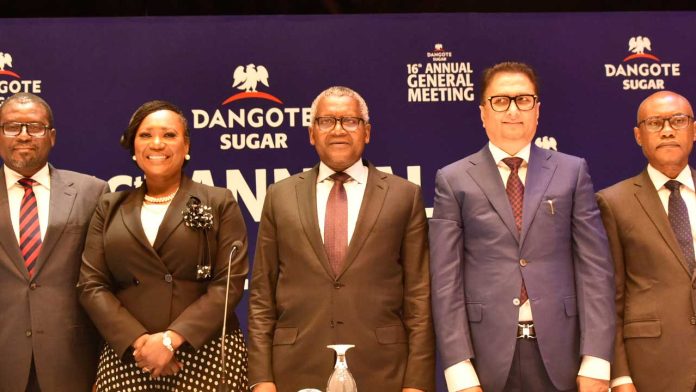Dangote Sugar Refinery Plc has reported a profit before tax (PBT) of N82.3 billion in the year ended December 31, 2022, indicating an increase of 142% to N48,28 billion over N34.billion recorded in the corresponding period in 2021.
According to the annual report of the Sugar Company, profit after tax rose to N54.74 billion, representing an increase of 148% to N32.69 billion compared to N22.05 billion posted in the same period in 2021.
All the performance indicators were on the upswing as revenue rose by 45 percent, from N278.05 billion to N403.25 billion while earnings per share rose from 182 kobo per share to 451 kobo per share, an increase of 269 kobo or 148 percent.
Meanwhile, Dangote Sugar had recently made massive investments in Adamawa State through the expansion of DSR Numan Sugar Refining capacity from 3,000 tonnes of cane per day (tcd) to 6,000 tcd, and to 9,800 tcd.
Speaking on the development, the Chairman of the company, Aliko Dangote noted that increasing the sugar refining capacity would require a corresponding increase in sugarcane production capacity.
According to Dangote, the company had concluded plans to increase its sugar plantation from the current land area under cane production of about 8,700 hectares in 2022 to about 24,200 hectares within the next seven years.
He mentioned also that the company has doubled its scholarship and empowerment schemes in its host communities and will continue to introduce more initiatives to support our host communities.
“Through these initiatives and our numerous Corporate Social Responsibility activities, DSR Numan will be able to touch the lives of the people, bringing social, economic, and infrastructural development to our host communities,” Dangote said.
He continued, “We are thus committing over $700 million to our investment in the Backward Integration Programme (BIP) to enable us to put in place needed infrastructure for the eventual commencement of full-scale production.”
Dangote, however, assured that the sugar company would change the trajectory by making Nigeria self-sufficient in the sector. Already, the company, he noted, has spent billions of naira in developing infrastructural facilities for host communities.













